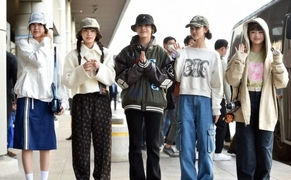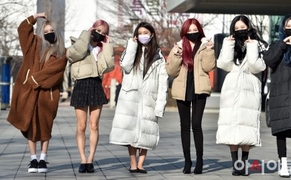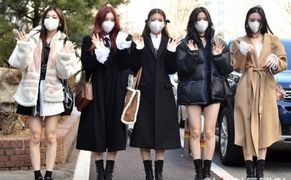What would be the qualifications of a Korean diplomat in response to the rapidly changing nature of diplomacy in our age? Here is a lecture entitled, "What does diplomacy mean in our age?" by Prof. Emanuel Pastreich, Senior Advisor of AsiaToday and director of The Asia Institute. This lecture was conducted for over fifty Korean diplomats engaged in the field of public diplomacy and cultural diplomacy at the Foreign Office building on June 27. [Editor's Note]
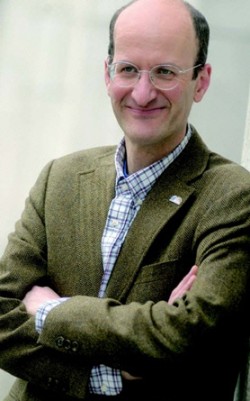 |
When I met with Korea’s Ambassador for public diplomacy Cho Hyun-dong last month we talked briefly about my current research and I met with a small group of diplomats interested in public diplomacy. Ambassador Cho made a rather unusual offer to me after our meeting. He suggested that I could come to the foreign ministry to deliver a talk on the topic.
He left it up to me to write the paper, giving me the freedom to explore various themes. He also suggested that there might be an opportunity to develop it into a more complete report or monograph at a later date.
I felt that this opportunity to talk with Korean diplomats about the field of diplomacy, rather than a specific topic in current affairs, was a tremendous honor, and a chance to share some of my ideas about the rapidly changing nature of diplomacy in our age.
I am deeply concerned about how the nature of international relations is being so rapidly transformed by technological change that the field of diplomacy is simply not keeping up and we will be facing a serious crisis in the future when nations are rocked by forces within and without of which policy makers simply have no understanding.
I spent many hours writing the talk and discussed its content with several friends in advance.
The sky over Seoul was bright blue and the lecture hall on the 19th floor had a perfect view of Bukhan Mountain and the Blue House. The room was filled with over fifty Korean diplomats engaged in the field of public diplomacy and cultural diplomacy.
I first discussed the impact of technology on international relations and how our assumptions about the nature of the nation state no longer applied. I then spent some time discussing the serious challenges posed by climate change and suggested that the response to climate change would increasingly dominate all aspects of diplomacy and security.
What was perhaps most unusual about the talk was the amount of time that I spent talking about the Confucian tradition and the strengths of traditional Korean government. I felt strongly that Koreans are not aware of just how many precedents for good government exist in Korea’s past and how much we can learn about good governance by studying past precedents from the sixteenth or seventeen centuries.
I drew attention to Choi Chi-won, the great Korean diplomat of the Silla Dynasty who used culture as a mean to reinforce relations between the two countries, and was perhaps uniquely able to play a central role in policy in both countries.
I closed the talk with a few remarks about the role of women in diplomacy. As I had anticipated, more than half of the diplomats in the audience were women. I told them that I had great hopes for an age in which women would play a central role in Korean diplomacy, but I also suggested that women had to create their own women’s culture that moved beyond the highly commercialized femininity that is rampant in Korean society.
I recommended that women needed to reinterpret the Confucian tradition to make it inclusive of women in order to assure that Korea did not lose the very best of the Confucian tradition of good governance. I hinted that only through the creative reinterpretation of Confucianism can we make it relevant to the present day, but at the same time, Korean Confucianism offered the potential of true innovation.
Here is the full text of my talk:
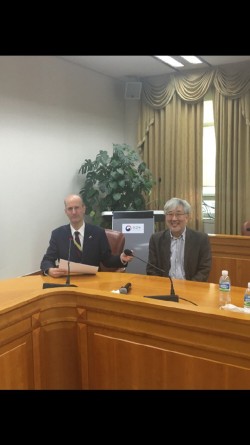 Emanuel Pastreich, Senior Advisor of AsiaToday/ Source: AsiaToday Emanuel Pastreich, Senior Advisor of AsiaToday/ Source: AsiaToday |
What does diplomacy mean in our age?
◇ The Essential Challenges
We live in an age of unprecedented change wherein the very institutions that we see around us are shifting and transforming and the very nature of international relations is evolving before our very eyes. So profound are the changes in the very nature of the economy, of society and of knowledge itself that ironically those changes are often invisible to us.
We lived in a period of relative stability in Korea for the last 50 years, encountering difficulties, but being relatively certain of what needed to be done in response to each challenge. The push to develop new industries that follow the directives set in the 1960s, to work within the stable US-led framework which assumed a stable and dominant US presence, and the basic assumptions about export-driven growth, security determined by tanks and fighter planes, and shared value system within advanced nations gave great confidence to Koreans.
But that age is over now and we will encounter increasing political chaos around the world, (including in places like Germany, the United States and Japan) and increasing conflicts of an unpredictable and ambiguous nature that will push us to the limits of our ability, and go beyond anything that we have encountered in our careers. In fact, the challenges are on a par to what Korea encountered at the end of the 19th century.
Such a situation is brought about by several factors that are difficult to separate, but which can be identified. The first factor is the exponential rate of technological change. As IT technology becomes faster and cheaper, the processing of information is becoming easier and new technologies in all fields are emerging more quickly than humans can keep up with. Our culture, our society and our government (and corporate) institutions are being radically transformed by that change.
As a result, we find that the names for things do not keep up with the nature of things. The names such as “bank”“diplomat”“corporation” stay the same, but the nature, the role and the purpose of those institutions are changing very dramatically. It is essential that we first assess honestly for ourselves how the world has change and come up—while we are only vaguely aware of those changes.
And international relations specifically is being transformed by what Frances Cairncross has termed the “death of distance.”New technologies are making distance an insignificant barrier to the communication and the transportation of goods, and with the advent of 3D printing, it may even be possible to transmit objects via the internet in the near future. Obviously certain decisions are made in this world by groups focused in specific places like Seoul or Washington D.C. but increasingly there is a complex network around the world that impacts that process and distance is often irrelevant to the decision-making process.
The second challenge we face has to do with has to with ideological and institutional decay around the world. The assumed social contract that undergirds government and corporations, that assures that each member of society feels a responsibility as part of a community to work together with others for a common good, and to do his or her duty, have grown weak and the function of institutions has grown ambiguous. People feel that they can get away with indulging in corrupt behavior, or irresponsible short-sighted actions to a degree that they could not have done in a previous age. We keep doing what we are doing, but we start to have doubts about the purpose of our actions.
Ethics and long-term planning has started to fall by the wayside and increasingly personal benefit becomes the primary purpose for networking in government and corporate institutions. Of course by the very nature of humans corrupt behavior exists in all ages, but this situation has grown much worse and those who are aware of the problem feel helpless to address it. Particularly in the case of government we find many who find (often against their own best judgment) working to represent specific interests, rather than the common good.
The reasons for this shift are complex. In part the change is a result of what a good life we have lived. We have not had to fight and die for what we enjoy and therefore started to think it was something that we just get for free. We have ceased to have communities, and rather we have become just individuals who float around in society with little loyalty to each other. Also, the rapid evolution of technology has connected us together in complex ways that are at odds with the function of the institutions we work for and thus created many paradoxes.
Finally, we face the tremendous challenge of climate change. Climate change is entering a decisive stage at which it will cease to be a slight inconvenience and become rather a life-and-death struggle for survival. We will have to reinvent our institutions, redirect our technology, and rethink our assumptions about the purpose of government and the nature of our economy in response to this overwhelming threat. The change will be profound, and the country which is best able to make this transition will be at an advantage. Korea has been lagging behind other countries in the adaptation to, and mitigation of, climate change. But that must change now. Korea has the potential to move faster than other countries, but sadly we have lacked the decisiveness and bravery to do so.
◇ The Korean vision
There has been a tremendous cultural boom around the world known as the “Korean Wave” and youth everywhere are drawn to the vitality of Korean music and film. Koreans have patted themselves on the back for this achievement, boasting that Americans now like “Gangnam Style.” But this form of influence through popular culture, if it lacks any ethical content, anything that inspires people to strive for something greater, will be quite limited in its impact. The real challenge going forward will whether Korea can develop and articulate its own vision for what the world should be and how the we can work together to address massive issues like climate change and adaptation to technological evolution. The increasing political chaos in the United States means that there will no longer be a clear guiding light to be found in Washington D.C. Koreans must first work together in small groups of dedicated individuals to come up with an agenda and then work with like-minded people around the world to implement that agenda. We must make the proposal, not just respond to someone else’s proposal.
This agenda obviously must be concerned with Korea’s own interests, but from now on it must also put considerable emphasis on common goals for the entire Earth and promote an inspiring vision of what is possible even in the midst of considerable chaos. The Korean vision for the world, the “Korean dream” for our age, is a new concept for Korean diplomats. It represents a radical change in Korean diplomacy. More often than not Koreans have assumed that they should model themselves on institutions like Brookings or CSIS, take notes on how advanced nations do things. But I am sorry to tell you that those institutions are not working that well these days. Koreans will need to create their own institutions and their own vision.
Where do we start and we try to create a new vision and approach to diplomacy? Ironically, although we are talking about a new diplomacy in response to unprecedented changes, the answer can be found not in the future, but in the past. We first need to transform institutions, and to regain confidence in what we do and our ability to make a better world. Korea’s past offers an answer to this challenge.
We may not think of issues like the transformation of the nation state by globalization as a topic for diplomats to contemplate, but it is the issue for our time and we need to start talking about it. The same is true for the increasing gap between the rich and the poor. Koreans should not be afraid to start addressing this ethical issue. We should embrace it as part of the global agenda and speak honestly. We will gain much respect for doing so.
Korea has a tremendous tradition of public service by intellectuals through the civil service system. Korea has many precedents for good government, for bringing in talent and assuring institutional reform that are not imported from abroad but indigenous. Although we often learn about that civil service system in a negative in light because of its corrupt form in the late Chosun, in fact it was one of the most effective systems for governance. I would suggest that the best way to advance out of a current corrupt political culture in which politicians chase after money and symbols of authority, is to restore a strong civil service system. It does not solve all problems, but it can give the ship of state a real compass.
Real change in diplomacy can start with just a small group. This group here is more than enough people to create a new culture of excellence.
First we must return to our much maligned Confucian roots. The public servant is not just a stable job. The public servant is an intellectual who is morally committed to contribute to the public good. The task is not easy, but it is of the highest value and should receive the highest respect.
We may be discouraged that we do not find great leaders around us and so we seek out leaders in rather imperfect politicians in our age. But in fact we can find great leaders to show us the way and regain the great tradition of diplomacy and good government in our own past who can inspire us to innovate and evolve, not in imitation of Western institutions, but rather in the creation of new interpretations of our own past achievements. This opportunity is critical when it comes to diplomacy. We have heroic figures like Choi Chi-won, who played a tremendous role in Silla’s relations with China, and in the development of a culture of excellence within the Tang dynasty bureaucracy. We do not need to have Choi Chiwon with us now in order to learn from him. You need to be aware that you inherit a great tradition and you can be inspired by it, but also that you have a responsibility to uphold it.
There many other examples of extremely innovative approaches to diplomacy that can be found in Goguryo, Goryo and Chosun in response to complex geopolitical shifts in the Song period, during the Mongol occupation, and the Ming-Qing translation. We can find inspiration in those efforts, and also we can find practical examples of diplomatic solutions in that past that will give us hint about where we should go. We should all become intellectuals, not to write articles and teach, but to come up with real solutions among ourselves.
Korea has a tremendous tradition in which scholars were committed to learning as an ethical activity and at the same time, that public officials were intellectuals who not only read broadly, discussed the ethical implications of their actions and their policies, but also who were engaged directly in the formulation of policy. They did not farm out policy to consulting firms or to think tanks, but rather they had the self-confidence to undertake such activities themselves.
We need a new generation of diplomats who become specialists in certain regions, even specific parts of countries like China or India. We need them to develop their own ideas and have the time to read books and discuss new concepts together as part of a process of learning for a lifetime. That is the great Korean tradition. We need, in that context, to stop outsourcing the discussion of policy and strategy to think tanks or consultants, and rather develop our competency internally.
◇ We need a strong government
Strong government does not mean a government that can do whatever it wants and oppress the people. Strong government means government that is firmly based in ethical principles and that can limit the abuse of power by corporations, by the rich, by multinational interest groups, establish a long-term plan for the nation and work together with multiple parties to realize that plan. A strong government can over-come the short-term vision of individuals and establish a common goal for the nation. Leaders like King Sejong have already established precedents for such government.
We need to start taking those reforms as a blueprint for what we should do, rather than relying on the writings of international think tanks which are increasingly driven by the mere pursuit of profit. The government itself can create think tanks, expertise, and reliable information. If the commercial media does not do its job, government is entirely capable of creating more reliable and trustworthy media. The problem is not media, it is the commitment of you to ethical principles and your ability to be creative, and unrelenting, in developing solutions.
But strong government is meaningless without the intellectual who is committed to society and expresses his or her will through government service.
Remember what Confucius wrote:
君子不器
This phrase has several different meanings. The first interpretation is that the intellectual should not be too much of a specialist, that his or her concern should be for ethical and cultural issues, and he or she should not just be a technical specialist working on immediate problems of a technical matter.
But this phrase also has the meaning of “the intellectual is not a tool.” That is to say that the intellectual, serving in government, must play by the rules and follow directives from above, but he or she is ultimately not a tool to be used by powerful interests, but rather the intellectual has his or her ethical stance and contributes through his or her support of good policy and or his or her resistance to unethical activities.
Here is the critical question: how can we, through our smallest daily actions, create a new culture, a culture that transforms our society, and global society, in a manner that money or power can never do? This problem is exactly the one that the great Confucian scholars of Korea and China struggled with for centuries and they figured out how, through the power of culture, of habits, of commitment to art and literature that has true ethical content. Those scholar officials were able to create a culture and through that culture create real, long-term positive change.
Powerful people could abuse power, seize control, but they would inevitably be brought back into the fold by these generations of scholar officials. That tradition in Korea has been sleeping for the last 80 years as we tend to embrace the myth of rapid industrialization, but that Confucian tradition is the best part of Korea and it is just waiting for us to bring it back to life.
Once we can engage and revive the tradition of good governance in Korea, and reinterpret that tradition to apply to the current conditions through a creative process, we can inspire people to go beyond just following orders.
That transformation of government can stretch around the world and we will find those with moderate ideas about politics, but a strong commitment to ethical principles in many countries who are ready to join with us in this effort to create a new form of diplomacy which is about intellectual engagement, about ethics and also about breaking out of the current cages we find ourselves in the sad diplomacy of superficial rituals.
Let us go back to Mencius for an insight into what the role of the public servant, both scholar and government official holding up high ethical values, can be in countering the undue influence of wealth and power.
Mencius writes that:
“you will not be corrupted by wealth or status
You will not be moved away from your goal by poverty or the lowliness of your position
You will not yield to threats of authority or force”
富贵不能淫
贫贱不能移
威武不能屈
I do not think Mencius meant that you never compromise in any case. Of course we must compromise, and sometimes compromise with wealth and power. The point is rather that we should set a standard that can inspire all of you to stand up for what is right, even in the face over overwhelming arguments for the failed or dangerous short-term approaches.
◇ The role of women
Let me conclude with a few words about the role of women in our society. I see that there are many women here and that increasingly women are playing an important role in diplomacy in Korea at every level. They are increasingly the language experts, the international relations experts.
We welcome women to play this critical role in Korean diplomacy and we look forward to an age in which the minister of foreign affairs is a woman and women play critical roles in diplomacy, defense and intelligence.
There are, however, some important conditions in order for the new role of women to be a success. On the one hand, we need to create an environment in which all offices of the foreign ministry and all embassies and consulates have free child care centers where women can leave their children when the work, and then watch their children via video from the office. We need a flexible system wherein women can work at home, or take off a year or two without it impacting their careers. In other words we need to recognize that in the long-term being a mother may well be the best training for being a diplomat and that the health of families is crucial.
At the same time, women need to raise their expectations for themselves. The Confucian tradition, which is the basis of Korean bureaucratic culture, is biased against women. It is also what makes Korea great. We can and we must reinterpret that tradition so as to make it relevant to women. When women, girls, think about their models, their heroes, they should not think only about pop singers, actresses and models, but should consider the tradition of great government officials and scholars, from King Sejong to the scholar Dasan to be their heroes and their models. That Confucian tradition does not belong to men any more. It belongs to all Koreans, and especially to women.
Women must be serious. They must devote themselves to their work and to learning about the fields that they will practice in depth. They must be extremely professional. They should not stop being women, or give up femininity, in order to be diplomats. But at the same time they must be firm, confident and capable of expressing themselves in a convincing manner in all circumstances.
Sadly, Korea is now swept by a wave of feminine consumerism that threatens to make all women waste their time thinking about clothes, make up, and drinking café latte at fashionable cafes. It is essential that the women who play the key role in diplomacy create their own culture, one based on the best of the Korean tradition, informed by the Western tradition, and focused on the true challenges of our age. They must be brave and reject this dangerous consumer culture.
I do not believe that the culture for women that I describe exists yet, but I think that you can create such a culture, and that the degree to which you do so will determine Korea’s future success.
◇ Conclusion
I have spoken about a variety of topics, some of which may not seem directly related with each other, although I believe that they are.
Perhaps I can make a suggestion as to what your response should be to these words. Obviously, if these words do not speak to you, you have no obligation to do anything.
But if you think you detect some fragment of truth in what I have said, I hope that you will spend a bit of time thinking about these points. These are words that are aimed at changing a culture. They are not words for the sake of words, but words for the sake of action.
We need to change our habits and culture, as much as changing any particular policy. We need to have a sense of crisis, for the challenges that Korea, and the world, face today, are extremely serious. We need to think about what we will do and we should not be afraid to talk with each other about what we need to do over lunch, and over coffee. It is no longer acceptable to think that difficult problems should be avoided so as not to spoil the mood.
At the same time, we need to be positive in our approach, to feel that what we do is meaningful and that what we can make a contribution. It is the combination of both a sense of crisis with a sense of optimism that can lead to true institutional change.
Korea has everything it needs to be the global leader and in many respects it is already the world’s leader in diplomacy. The challenge is to combine Korean knowhow and Korean technology and resources with a moral clarity, an ethical commitment.
Most Read
-
1
-
2
-
3
-
4
-
5
-
6
-
7


















